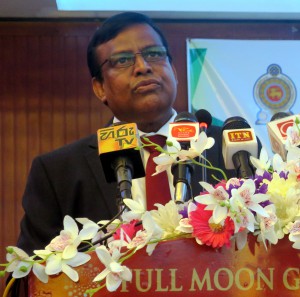
Select Page
The Asian Productivity Organization (APO) along with the Sri Lankan Ministry of Agriculture and National Productivity Secretariat (NPS) is organizing a five-day workshop on Climate Change Adaptation and Disaster Risk Management in Agriculture in Colombo, 11–15 September 2017. The workshop is supported by the Centre on Integrated Rural Development for Asia and the Pacific (CIRDAP) and Economic Research Institute for ASEAN and East Asia (ERIA).
While fluctuations in the frequency, timing, and magnitude of precipitation and temperature are directly affecting farm produce, other climate change-driven disasters like frequent unpredictable floods and droughts, heat waves, heavy snowfalls, glacial melting, and increased incidence of pests and diseases are also causing widespread damage and losses to the agricultural sector.
The consequent crop failures and livestock deaths could cause huge economic hardships, leading to volatility in agricultural markets and higher food prices that may severely impact food security in many developing countries. The APO workshop is part of its efforts to share smart approaches and innovative technologies for climate change adaptation and disaster risk management in agriculture.
The workshop will also enable participants to review policies, programs, and plans for developing climate change adaptation measures in agriculture and managing risks of extreme weather events and disasters. They will be assisted in formulating action plans for their countries to integrate climate change adaptation and climate related-disaster risk management measures into national agricultural policy, programs, and plans for developing sustainable agriculture.
Twenty-nine participants representing government ministries, public organizations, academia, and consultancy services, among others, from 11 member countries are attending. Seven resource persons from ERIA, India, Pakistan, Sri Lanka, and Thailand will give presentations on the assigned themes and conduct technical sessions.

Ministry of Agriculture Secretary Wijayaratne Badullage delivering welcoming remarks at the opening session of APO workshop on Climate Change Adaptation and Disaster Risk Management in Agriculture.
In his remarks at the workshop, Chief Guest and Secretary, Ministry of Agriculture, Wijayaratne Badullage noted that it was the ideal time to conduct such an international workshop in Sri Lanka as the country was devising measures to adapt to climate change and manage disaster risk in agriculture.
“Presently, climate change and disaster risk management are main concerns of all countries in Asia, including Sri Lanka. In terms of natural disasters, droughts and floods are the most common affecting the agriculture sector. Among the most critical in tropical countries is drought,” Secretary Badullage said, adding that recently, Sri Lanka had been subjected to both floods and droughts and the government had implemented many special programs to overcome them in the future.
The minister believed that discussions of disaster risk management in the face of climate change were timely and he considered it “a privilege” for Sri Lanka to host the workshop, which would provide an opportunity to improve participants’ knowledge and enable them to implement climate change mitigation measures and risk management programs in their countries.
Welcoming guests, participants, and experts to the opening session, APO Agriculture Program Officer Mitsuo Nakamura told them, “Climate change is one of the biggest global challenges that the human race has ever faced and it is impacting all sectors of the economy. The variations in weather patterns have already started affecting agriculture. Today, agriculture faces the triple challenge of ensuring food security through enhancing productivity, increasing climate resilience, and contributing to climate change mitigation.”
He stated that a key objective of the APO was to build the capacity of relevant individuals and organizations to improve the productivity and performance of the agriculture sector in an environmentally friendly manner. “Such capacity-building initiatives are essential for governments to plan appropriate policies and for organizations to undertake projects to promote sustainable development in agriculture,” he stressed.
Nakakmura hoped that the workshop would go a long way toward enhancing participants’ understanding of climate change adaptation and disaster risk management in agriculture: “To achieve greater multiplier effects, I strongly urge you to utilize and disseminate the lessons and insights acquired.” He concluded by thanking the Sri Lankan Ministry of Agriculture and NPS for hosting the workshop and CIRDAP and ERIA for their support in conducting it.